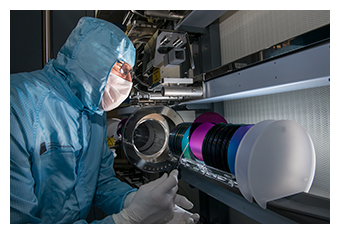Silicon photonics consortium receives £4.8m R&D boost
Integrated technology and systems innovator for next-gen networks, Rockley Photonics, will, over the next five years, match government funding from the EPSRC, and form a ‘Prosperity Partnership’ with the University of Southampton’s Optoelectronics Research Centre (ORC). The money, totalling around £4.8m, will be used to support research into how silicon photonics technology can be used to improve data centre communication networks and support a new integrated photonics platform for broader mass market applications.
Dr Andrew Rickman, Founder, CEO and Chairman of Rockley Photonics, said: “We are honoured to have our technology and business endeavors supported and recognised by the EPSRC in this extraordinary funding initiative.”
He continued: “Rockley Photonics and The University of Southampton team has a long-standing history of working together. Our partnership, built up over many years, demonstrates the value of relationships between academia and commercial enterprises such as ours. It gives us the ability to combine resources and academic excellence and focus on ground-breaking, early-stage technologies, such as silicon photonics.
“Research in to this area is progressing quickly, and in the very near future, this game-changing, disruptive technology will soon have a huge impact on the future architecture design of large data centres; improve the power and compute capacity of new consumer devices and provide robust sensing solutions in a variety of industry sectors, such autonomous vehicles and biomedical. All this at dramatically lower cost and with considerably less power requirements.”
 Graham Reed, Professor of Silicon Photonics at Southampton, commented: “Andrew Rickman, Chief Executive Officer of Rockley Photonics, is the world’s leading entrepreneur in this field. We have a long history of working together and this collaboration is almost the perfect fit for the remit of the Prosperity Partnerships – a truly mutual relationship between university and industry.
Graham Reed, Professor of Silicon Photonics at Southampton, commented: “Andrew Rickman, Chief Executive Officer of Rockley Photonics, is the world’s leading entrepreneur in this field. We have a long history of working together and this collaboration is almost the perfect fit for the remit of the Prosperity Partnerships – a truly mutual relationship between university and industry.
“At Southampton, our expertise and facilities offer a unique environment for silicon photonics research and innovation. One of the world’s most pressing problems is how to handle our relentless desire for more data and we are striving to make significant improvements.”
Professor Nigel Titchener-Hooker, Professor of Biochemical Engineering at UCL, who chaired the panel that approved the Prosperity Partnerships projects, said: “The quality of the applications we reviewed was outstanding. The breadth of applications too speaks to the diversity of UK industry and to the alignment between the UK’s very best academic teams and our industrial base.
“The grants promise to create a series of exciting avenues of research leading to industrial implementation. It's a wonderful new example of how, in partnership, we can harness our collective capabilities to strengthen our economy and once again underscores the importance of ongoing investment in the higher education research base.”
The challenge ahead
The UK can make a huge contribution to the development of silicon photonics and Rockley Photonics’ interest in this area comes from a long and deep understanding of this technology and emerging applications.
The world’s increasing aptitude for generating astronomic volumes of IP traffic is taking its toll. Data centres are currently consuming about three percent of the global electricity supply – 416.2TWh last year. That is more than the total consumption of many individual European countries including the Netherlands, Norway, Sweden, Poland and the United Kingdom.
Some of the world’s key challenges are handling and manipulating the enormous amounts of data associated with the modern world, as well as the energy implications of doing so. Silicon photonics is seen as one of the key technologies to solve some of these key challenges, particularly in the deployment of energy efficient solutions for large data centres, as well as applications in high performance computing.





